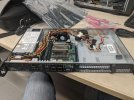Hi!
Before i jump into completely new world of virtualization (for me of course) please a need a hint that my choosen hardware will play fine with Proxmox. I need to replace my 6 year old homelab (ESXi) server (i5, 32 gigs of ram, hw raid with 6 drives..). Nothing special, but it runs well for all that time. I wann't to replace it with this new sexy small combo which seems almost ideal for me:
Thanks to anyone who will find time to reply me Stay safe & healty!
Stay safe & healty!
Before i jump into completely new world of virtualization (for me of course) please a need a hint that my choosen hardware will play fine with Proxmox. I need to replace my 6 year old homelab (ESXi) server (i5, 32 gigs of ram, hw raid with 6 drives..). Nothing special, but it runs well for all that time. I wann't to replace it with this new sexy small combo which seems almost ideal for me:
- https://www.supermicro.com/en/products/motherboard/M11SDV-8C-LN4F (AMD EPYC 3251 soc - small but powerfull)
- https://www.supermicro.com/en/products/chassis/1u/505/SC505-203B
- 64Gb of RAM
- 4 x Samsung EVO860 2Tb
- 1 x M.2 drive
Thanks to anyone who will find time to reply me
Last edited:


